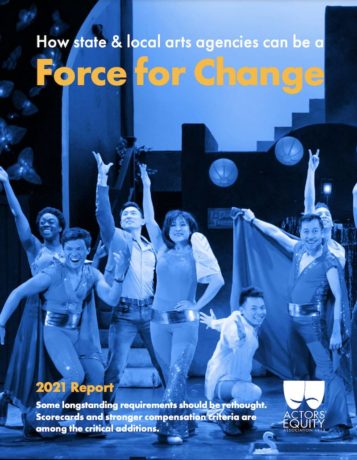Many grant-making agencies lack criteria to support a truly inclusive arts industry, according to a national study released December 14, 2021, at the National Press Club by Actors’ Equity Association, which reviewed the grant criteria of the nation’s largest state and local art agencies prior to the pandemic. The AEA study of nearly 50 agencies that issue grants to local arts organizations found:
• Fewer than 10 percent required performers to be paid a living wage as part of their grantmaking.
• Fewer than 12 percent required a commitment to diversity and inclusion.
• 82 percent used a rubric that included some diversity and inclusion criteria.
• 27 percent requested demographic data as part of the grant application.
• 44 percent had separate grant programs for marginalized communities.
• 69 percent had some grant requirements that stifle diversity.

“As theater continues to reopen, it has to look different than the industry that shut down in March 2020,” said Actors’ Equity President Kate Shindle. “This report outlines specific ways that state and local governments can make real change. By requiring fair pay for artists and removing barriers that exclude organizations by and for people of color and other marginalized communities, funders can drive DEI [diversity, equity, and inclusion] in the arts organizations they support.”
This study marks the third national study on diversity and inclusion released by Actors’ Equity Association since 2017. Equity’s prior study, in 2020, found that only 23 percent of union acting and stage management jobs are held by people of color, despite the fact that people of color comprise nearly 40 percent of the U.S. population.

Earlier this year, Actors’ Equity Association joined with fellow arts, entertainment, and media industry unions to release a federal policy agenda for increasing diversity, equity, and inclusion in the arts. Among the recommendations in that report, Congress should:
• Increase funding for the NEA, NEH, and CPB;
• Work with stakeholders, including unions, to develop diversity hiring and reporting objectives for grant recipients, such as requiring that applicants provide a three-year lookback report on recruitment, hiring, and promotion;
• Authorize funding for Chief Diversity Officer positions at the NEA, NEH, and CPB to drive inclusion in the grantmaking process; and
• Establish an incubator grant program to help underrepresented people pursue creative projects and make connections with industry mentors.
ACTORS’ EQUITY ASSOCIATION, founded in 1913, is the U.S. labor union that represents more than 51,000 professional actors and stage managers. Equity endeavors to advance the careers of its members by negotiating wages, improving working conditions, and providing a wide range of benefits (health and pension included). Member: AFL-CIO, FIA. actorsequity.org #EquityWorks




